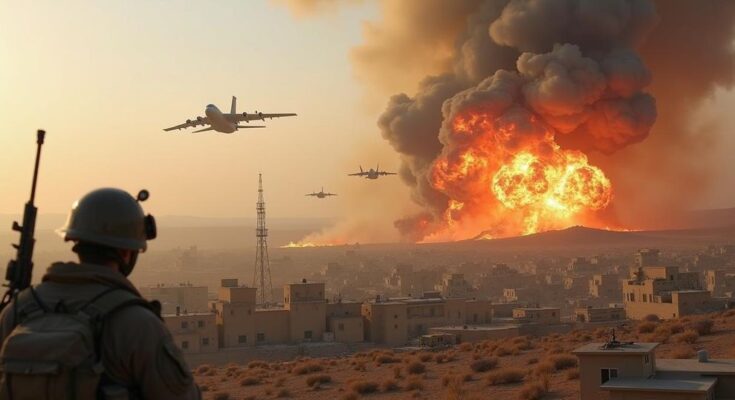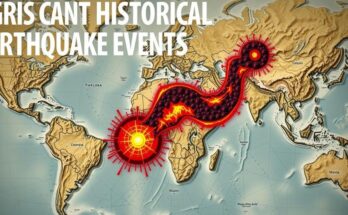Tensions escalate between Iran and Israel with major airstrikes resulting in numerous casualties in Gaza and southern Lebanon. Hezbollah prepares for prolonged conflict after significant leadership losses. International response includes calls to reconsider peacekeeper presence and trade agreements with Israel.
Our continuous coverage addresses the escalating conflict between Iran and Israel, which has intensified hostilities across the Middle East. An Israeli airstrike in central Gaza on Sunday night resulted in the deaths of at least 20 individuals, including children, as reported by local medical facilities. Concurrently, Hezbollah is reportedly preparing for an extended conflict in southern Lebanon following the Israeli military’s significant decimation of its leadership. New military operations are being coordinated to oversee rocket fire and ground engagements, as stated by informed sources. Key updates reflect the current state of affairs: the Israel Defense Forces (IDF) reported that approximately 200 Hezbollah targets were neutralized, leading to numerous casualties from airstrikes in southern Lebanon. Sirens were activated in central Israel due to projectiles launched from Lebanese territory, indicating ongoing cross-border hostilities. In light of these developments, Israel’s Prime Minister Benjamin Netanyahu has called for the withdrawal of UN peacekeeping forces from Lebanon, while the French foreign ministry articulated the necessity of allowing UN peacekeepers to fulfill their designated roles. Moreover, the European Union’s foreign policy chief, Josep Borrell, refuted allegations of anti-Semitism against UN Secretary-General Antonio Guterres, underscoring the UN Security Council’s authority in determining peacekeeping missions. In a further demonstration of international concern, Spanish Prime Minister Pedro Sanchez has advocated for other EU nations to join Spain and Ireland in suspending the bloc’s free trade agreement with Israel, citing its actions in Gaza and Lebanon. Additionally, Hezbollah has claimed to have targeted Israeli military installations, including recent rocket attacks on an army facility in central Israel. The IDF continues its operations both in southern Lebanon and the Gaza Strip, signifying a complex and volatile situation in the region.
The ongoing conflict between Iran and Israel is a significant point of tension in the Middle East, characterized by intermittent violence and shifting power dynamics, particularly involving Hezbollah, an Iran-aligned militia. This conflict has intensified with recent airstrikes and retaliatory actions from both sides, drawing international attention and responses. The presence of UN peacekeeping forces is also under scrutiny as tensions escalate, with calls for changes to their mandate by Israeli leadership. The international community, particularly the European Union, is reacting to the humanitarian implications of the conflict, further complicating geopolitical relations in the region.
In summary, the conflict between Iran and Israel has seen a dramatic escalation, with significant casualties reported in recent airstrikes and ground operations. Efforts to address the situation by international leaders highlight the complexity and urgency of the current crisis. The sustained military actions from both Hezbollah and the IDF signal an ongoing and potentially protracted conflict, necessitating careful observation and strategic diplomatic efforts to mitigate further escalation and humanitarian impacts in the region.
Original Source: www.deccanherald.com




